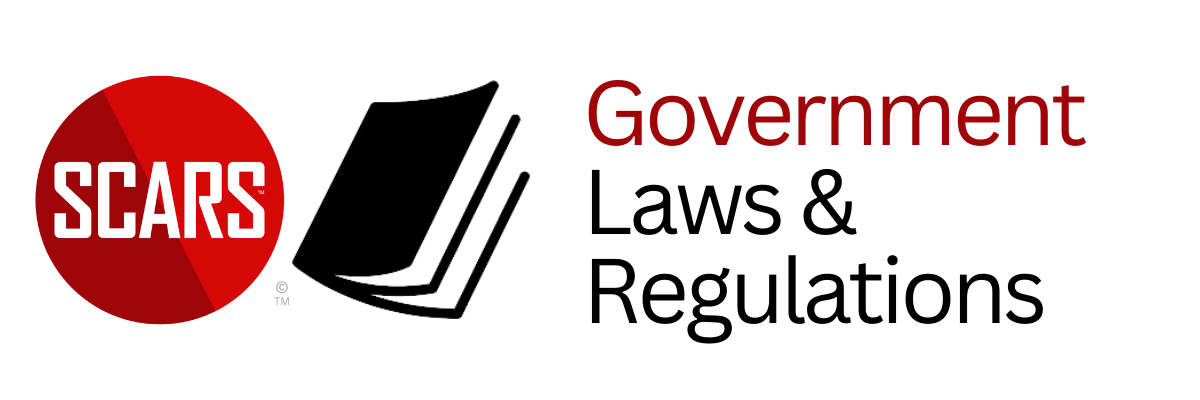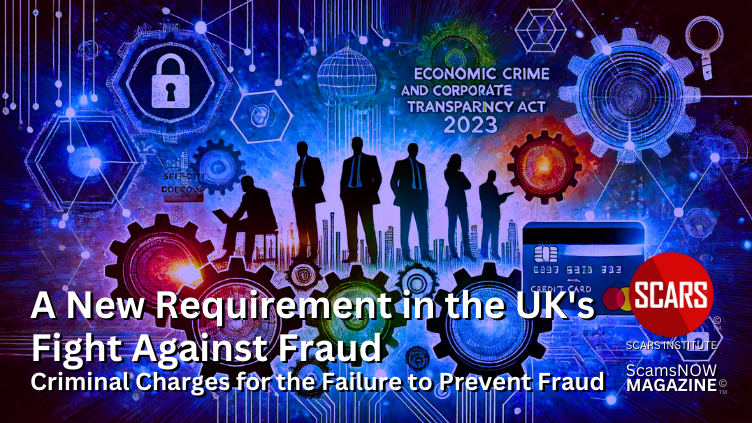A New Requirement in the UK’s Fight Against Fraud: Criminal Charges for the Failure to Prevent Fraud
The UK’s Failure to Prevent Fraud Guidance and Potential Impact on All Major Businesses in the United Kingdom – This Becomes the Game Changer in the UK’s Battle Against Scams and Fraud
Primary Category: Government Regulations
Authors:
• SCARS Editorial Team – Society of Citizens Against Relationship Scams Inc.
• Analysis by Tim McGuinness, Ph.D., DFin, MCPO, MAnth – Anthropologist, Scientist, Polymath, Director of the Society of Citizens Against Relationship Scams Inc.
About This Article
The Economic Crime and Corporate Transparency Act 2023, along with the “Failure to Prevent Fraud” guidance, sets new standards for fraud prevention in the UK’s corporate landscape. It requires large organizations to implement comprehensive fraud prevention strategies across all levels, from top-level commitment to ongoing monitoring and training.
This law is particularly relevant to the payments ecosystem, including credit card processing, as it mandates companies to adopt robust fraud controls, conduct rigorous due diligence, and establish effective reporting channels. This proactive approach not only strengthens corporate accountability but aims to protect consumers from scams and financial fraud by closing potential security gaps in the financial system.
As organizations work to meet these standards, consumers can expect enhanced fraud detection and prevention, greater transparency, and possibly better avenues for redress in cases of fraud. While full compliance will take time and pose challenges, particularly for high-risk and complex industries, the legislation represents a significant step forward in reducing fraud risks and building trust in the UK’s payments ecosystem.

The UK’s Failure to Prevent Fraud Guidance and Potential Impact on All Major Businesses in the United Kingdom
This becomes the game changer in the UK’s Battle Against Scams and Fraud
The Home Office of the United Kingdom just released their: Economic Crime and Corporate Transparency Act 2023: Guidance to organisations on the offence of failure to prevent fraud.
This has significant potential to impact businesses, including the fight against scams, fraud, and cybercrimes in the UK.
Summary of Guidance Document
The document provides guidance on the “Failure to Prevent Fraud” offense under the Economic Crime and Corporate Transparency Act 2023, designed to hold large organizations accountable if their associated persons (employees, agents, subsidiaries) commit fraud with the intent to benefit the organization or its clients. It mandates organizations to implement “reasonable fraud prevention procedures” or face criminal liability, though it does not apply to small organizations. Key components include top-level commitment, risk assessment, proportionate prevention measures, due diligence, and ongoing communication, monitoring, and review. The document specifies the types of fraud covered, outlines who qualifies as an associated person and includes examples of compliance strategies and penalties for non-compliance. Importantly, the law introduces a nine-month implementation period and emphasizes sector-specific guidance, particularly for high-risk industries.
Analysis Overview: Impact on Scam and Fraud Control and Enforcement
This new legislation represents a significant step in corporate fraud prevention by shifting the onus onto large organizations to actively prevent fraudulent activity by those acting on their behalf. The requirement for “reasonable prevention procedures” encourages a proactive stance on fraud, likely improving internal monitoring and fraud awareness within organizations. With top management held accountable for ensuring compliance, this law may also foster a cultural shift toward zero tolerance for fraud across corporate structures.
In Detail
In terms of enforcement, the guidance suggests that prosecutors will assess compliance with these preventive measures when determining penalties. The emphasis on risk-based procedures allows flexibility but also demands a high level of internal control and vigilance, which could prove challenging for organizations with complex supply chains or international operations. Penalties include fines and, potentially, deferred prosecution agreements (DPAs), offering a structured yet impactful means of addressing corporate fraud. This approach aligns with broader government efforts to tackle economic crime, pushing large organizations toward transparent, consistent fraud prevention practices.
Under the “Failure to Prevent Fraud” offense established by the Economic Crime and Corporate Transparency Act 2023, corporations and large businesses are given specific responsibilities to actively prevent fraud by implementing rigorous internal controls and fraud prevention measures. These responsibilities, aimed at large organizations rather than small businesses, represent a shift toward corporate accountability, requiring organizations to take proactive, continuous steps to detect and deter fraudulent activities committed by associated persons, such as employees, agents, and subsidiaries. Here’s a deeper look into these responsibilities:
1. Top-Level Commitment
Corporations are required to demonstrate a strong, visible commitment to fraud prevention from top-level management down. Executives and board members are expected to set the tone for a zero-tolerance policy on fraud and make it clear that fraud prevention is a priority throughout the organization. This commitment includes overseeing the implementation of fraud prevention measures, setting clear anti-fraud policies, and ensuring that employees understand the importance of fraud prevention. By embedding fraud prevention into the corporate culture, organizations can help ensure that ethical behavior is prioritized and that fraudulent behavior is neither tolerated nor ignored.
2. Risk Assessment
One of the primary responsibilities is for corporations to conduct regular and comprehensive risk assessments to identify areas where they are vulnerable to fraud. This involves evaluating various aspects of the business, including operations, finance, third-party relationships, and geographic locations where fraud risk may be heightened. Organizations are required to tailor their fraud prevention strategies to address these specific risks, which may vary based on industry, corporate structure, and market conditions. For example, a financial services company might focus on monitoring financial transactions and customer interactions, while a multinational manufacturing firm might focus on procurement and supply chain fraud risks.
3. Implementing Proportionate Fraud Prevention Procedures
Corporations must design and implement fraud prevention procedures that are “reasonable” and proportionate to their specific risk levels and operational scale. This means that prevention measures should be neither excessive nor minimalistic but should match the organization’s particular needs and vulnerabilities. These procedures could include internal controls such as automated transaction monitoring, regular audits, secure information handling processes, and clear protocols for identifying and reporting suspicious activities. The goal is to establish a system that not only deters fraud but also provides early detection of any fraudulent activity.
4. Due Diligence on Associated Persons
Corporations have a duty to perform due diligence on associated persons, which includes employees, agents, contractors, suppliers, and any third parties that act on behalf of the organization. This means evaluating the trustworthiness, ethical standards, and track records of these individuals or entities before entering into business relationships. For instance, conducting background checks on key personnel, assessing the compliance history of vendors, and monitoring ongoing relationships are all steps corporations can take to reduce the risk of fraud committed by associated persons. This aspect of due diligence is particularly crucial for organizations operating in high-risk industries or jurisdictions with lax regulatory environments.
5. Training and Communication
Clear, ongoing communication is essential for a robust fraud prevention strategy. Corporations are responsible for educating employees and associated persons on the importance of fraud prevention, the specific measures in place, and the consequences of engaging in fraudulent activities. Regular training sessions should be conducted to ensure that all individuals understand how to identify, report, and prevent fraud. This training not only covers legal compliance but also reinforces the organization’s ethical standards and fosters a shared commitment to fraud prevention.
6. Monitoring and Reviewing Fraud Prevention Measures
Corporations are required to continuously monitor, test, and improve their fraud prevention measures. This includes reviewing the effectiveness of controls, identifying any weaknesses or gaps in fraud prevention procedures, and making adjustments as needed. Regular monitoring could involve conducting internal audits, setting up anonymous reporting channels for whistleblowers, and utilizing technology to track suspicious patterns. Additionally, corporations must adapt their fraud prevention strategies to reflect changes in the business environment, emerging fraud risks, or regulatory requirements.
7. Reporting and Transparency
Although not explicitly detailed in the guidance, part of maintaining a strong fraud prevention framework involves transparent reporting practices, both internally and externally. Internally, this means fostering a culture where employees feel comfortable reporting suspicious activities without fear of retaliation. Externally, corporations should be prepared to report and cooperate fully with enforcement agencies if fraud is detected within their organization. Transparency and collaboration with regulatory bodies can be viewed as an extension of the organization’s commitment to maintaining a high standard of ethical conduct.
8. Consequences of Non-Compliance
If an organization fails to prevent fraud due to lack of appropriate procedures, it may face criminal liability, including potentially severe penalties. This can include substantial fines, as well as deferred prosecution agreements (DPAs), which allow organizations to avoid prosecution by meeting certain requirements, such as implementing corrective measures and complying with future monitoring. By enforcing these penalties, the legislation incentivizes corporations to maintain robust fraud prevention measures and reinforces that non-compliance has serious consequences.
Practical Implications for Corporations and High-Risk Industries
For corporations, particularly those in high-risk industries like finance, technology, or healthcare, meeting these responsibilities will require investment in compliance infrastructure and ongoing vigilance. Compliance teams may need to expand, risk assessment tools will become more sophisticated, and internal processes will need to integrate fraud prevention at every level of operation. By proactively managing these responsibilities, organizations can reduce the likelihood of fraud and demonstrate accountability, which can ultimately protect their reputation and bottom line.
Impact on the Credit Card Payables Ecosystem in the UK
The Economic Crime and Corporate Transparency Act 2023 introduces a “failure to prevent fraud” offense, holding large organizations criminally liable if they do not have reasonable fraud prevention procedures in place.
This legislation significantly impacts the UK’s payables ecosystem, particularly in credit card processing.
Increased Compliance Obligations
Organizations involved in credit card processing must implement robust fraud prevention measures to comply with the new law. This includes developing and maintaining procedures to prevent fraud by employees, agents, or third parties acting on the company’s behalf. Failure to do so could result in criminal liability.
Enhanced Due Diligence
Companies must conduct thorough due diligence on clients and partners to identify potential fraud risks. This involves verifying the identities of individuals and entities involved in transactions and monitoring for suspicious activities. Enhanced due diligence helps detect and prevent fraudulent activities within the payment processing chain.
Staff Training and Awareness
Regular training programs are essential to educate employees about fraud risks and prevention strategies. Staff should be trained to recognize and report suspicious activities, ensuring that fraud prevention is integrated into the company’s culture.
Monitoring and Reporting Mechanisms
Implementing effective monitoring systems to detect fraudulent activities is crucial. Companies should establish clear reporting channels for employees to report suspected fraud, ensuring timely investigation and response.
Collaboration with Regulatory Bodies
Engaging with regulatory authorities and industry bodies is important to stay informed about best practices and compliance requirements. Collaboration can provide insights into emerging fraud trends and effective prevention strategies.
Impact on Credit Card Processing
The act necessitates that credit card processors enhance their fraud detection and prevention systems. This may involve investing in advanced technologies and revising existing protocols to align with the new legal requirements. Failure to implement adequate measures could result in legal consequences and reputational damage.
Specifically, Against Scams
The Economic Crime and Corporate Transparency Act 2023 and the “failure to prevent fraud” offense are poised to have a significant impact on the fight against scams and financial fraud. By holding organizations accountable for fraud prevention, this law is designed to strengthen the ecosystem’s defenses against scams, improve corporate responsibility, and ultimately reduce the prevalence of fraud in the UK payments and financial services sectors. Here’s what victims and the public can expect:
Increased Accountability and Deterrence
-
- Corporate Responsibility: By making organizations legally responsible for preventing fraud, the law adds a layer of accountability that was previously lacking. Companies in the payments sector, particularly large ones, are now motivated to take fraud prevention seriously or face criminal liability. This shift means businesses will need to proactively address vulnerabilities in their systems, minimizing the entry points that scammers might exploit.
- Deterrence: With the threat of penalties and reputational damage, the law acts as a deterrent for organizations that might otherwise overlook fraud risks. Over time, this should lead to more vigilant practices in monitoring and addressing fraud at every level of the payments ecosystem.
Enhanced Fraud Detection and Prevention Measures
-
- More Robust Security Practices: As organizations implement the “reasonable fraud prevention procedures” required by the law, the public can expect more secure payment processes, better identity verification methods, and more consistent monitoring for suspicious transactions. This will likely make it harder for scammers to operate undetected.
- Better Protection for Consumers: Organizations will likely focus more resources on fraud detection technologies, such as AI-driven monitoring systems, which can analyze patterns and flag potentially fraudulent activity in real-time. This could prevent scams from progressing by detecting and halting fraudulent transactions before they affect victims.
Improved Support and Redress for Victims
-
- Transparency and Reporting: As part of compliance, organizations may need to be more transparent in their responses to fraud incidents and offer clear pathways for victims to report suspected fraud. The public can expect more accessible channels for raising concerns and reporting scams, as organizations will be required to address these issues systematically.
- Potential for Greater Compensation: With increased responsibility on organizations to prevent fraud, victims of scams may have a better chance of seeking redress if the organization failed in its duty to prevent fraud. While compensation mechanisms will still depend on the specifics of each case, the framework encourages organizations to address fraud incidents swiftly and fairly, reducing the financial and emotional toll on victims.
Strengthening of the Financial Ecosystem Against Scams
-
- Unified Industry Standards: To comply with the law, many organizations will adopt industry-wide best practices for fraud prevention. This alignment can strengthen the overall financial ecosystem, as companies work towards consistent standards that make scams more difficult to execute and maintain.
- Increased Cooperation Between Organizations: As companies work to comply with the new legislation, there will likely be more collaboration across the financial sector to share insights, risks, and effective strategies. This collaboration is essential in identifying and tackling emerging scam trends and reducing vulnerabilities in the payables ecosystem.
Challenges and Adjustments in the Short Term
-
- Growing Pains in Compliance: As organizations adjust to the new requirements, there may be temporary delays or friction in transaction processes, as companies refine their fraud prevention strategies. While these measures are designed to protect consumers, there may be a period of adjustment as systems and protocols are tested and improved.
- Potential Impact on Smaller Businesses: Although the law primarily targets large organizations, smaller businesses within the payments ecosystem may feel indirect pressure to meet similar standards, especially if they interact with larger entities requiring stricter fraud prevention measures. This may lead to increased operational costs, which could be passed on to consumers in some cases.
Better Public Awareness and Education on Scam Prevention
-
- Heightened Awareness Efforts: To ensure that consumers understand new fraud prevention measures and what to expect, organizations may increase their public awareness campaigns on fraud. This could mean more educational resources on common scam tactics, better visibility into secure transaction practices, and more guidance on how to protect oneself from fraud.
- Empowered Consumers: With a greater understanding of fraud risks and prevention strategies, the public can make more informed decisions, potentially reducing the number of people who fall victim to scams. As companies improve their prevention efforts, consumers who engage with these measures (e.g., enabling two-factor authentication, reviewing suspicious activities) will be better protected against fraud.
Summary
A Positive, If Gradual, Shift in the Fight Against Fraud Scams and Cybercrime
The “Failure to Prevent Fraud” offense places a substantial responsibility on corporations to prevent fraud through strong, risk-based procedures that are continuously monitored and improved. This proactive approach not only seeks to prevent fraud internally but also sets a standard for ethical conduct in corporate environments. Through rigorous implementation and adherence to these responsibilities, corporations can significantly strengthen their defenses against fraud and contribute to a broader culture of accountability and transparency in business practices.
The Economic Crime and Corporate Transparency Act 2023 imposes significant responsibilities on organizations within the UK’s payables ecosystem, particularly in credit card processing. Companies must adopt comprehensive fraud prevention measures, conduct diligent monitoring, and foster a culture of awareness to comply with the new legal framework and mitigate fraud risks. Because the major players in the UK card processing (VISA, MasterCard, AmericanExpress, etc.) are affected by this, we should see many of its aspects filter into their worldwide operations, improving fraud controls everywhere.
The new legislation and guidance represent a positive development in the fight against scams and financial fraud. Although full compliance across the ecosystem will take time, the law incentivizes organizations to take fraud prevention more seriously, aligning with a larger, nationwide effort to protect consumers. For victims and the public, these changes mean improved protection, more reliable reporting channels, and possibly greater access to redress if fraud does occur. While challenges in enforcement and adaptation are inevitable, the law has the potential to significantly enhance trust and security within the UK payments ecosystem over time.
-/ 30 /-
What do you think about this?
Please share your thoughts in a comment below!
-/ 30 /-
What do you think about this?
Please share your thoughts in a comment below!
Important Information for New Scam Victims
- Please visit www.ScamVictimsSupport.org – a SCARS Website for New Scam Victims & Sextortion Victims.
- SCARS Institute now offers its free, safe, and private Scam Survivor’s Support Community at www.SCARScommunity.org – this is not on a social media platform, it is our own safe & secure platform created by the SCARS Institute especially for scam victims & survivors.
- SCARS Institute now offers a free recovery learning program at www.SCARSeducation.org.
- Please visit www.ScamPsychology.org – to more fully understand the psychological concepts involved in scams and scam victim recovery.
If you are looking for local trauma counselors, please visit counseling.AgainstScams.org
If you need to speak with someone now, you can dial 988 or find phone numbers for crisis hotlines all around the world here: www.opencounseling.com/suicide-hotlines
Statement About Victim Blaming
Some of our articles discuss various aspects of victims. This is both about better understanding victims (the science of victimology) and their behaviors and psychology. This helps us to educate victims/survivors about why these crimes happened and not to blame themselves, better develop recovery programs, and help victims avoid scams in the future. At times, this may sound like blaming the victim, but it does not blame scam victims; we are simply explaining the hows and whys of the experience victims have.
These articles, about the Psychology of Scams or Victim Psychology – meaning that all humans have psychological or cognitive characteristics in common that can either be exploited or work against us – help us all to understand the unique challenges victims face before, during, and after scams, fraud, or cybercrimes. These sometimes talk about some of the vulnerabilities the scammers exploit. Victims rarely have control of them or are even aware of them, until something like a scam happens, and then they can learn how their mind works and how to overcome these mechanisms.
Articles like these help victims and others understand these processes and how to help prevent them from being exploited again or to help them recover more easily by understanding their post-scam behaviors. Learn more about the Psychology of Scams at www.ScamPsychology.org
SCARS INSTITUTE RESOURCES:
If You Have Been Victimized By A Scam Or Cybercrime
♦ If you are a victim of scams, go to www.ScamVictimsSupport.org for real knowledge and help
♦ SCARS Institute now offers its free, safe, and private Scam Survivor’s Support Community at www.SCARScommunity.org/register – this is not on a social media platform, it is our own safe & secure platform created by the SCARS Institute especially for scam victims & survivors.
♦ Enroll in SCARS Scam Survivor’s School now at www.SCARSeducation.org
♦ To report criminals, visit https://reporting.AgainstScams.org – we will NEVER give your data to money recovery companies like some do!
♦ Follow us and find our podcasts, webinars, and helpful videos on YouTube: https://www.youtube.com/@RomancescamsNowcom
♦ Learn about the Psychology of Scams at www.ScamPsychology.org
♦ Dig deeper into the reality of scams, fraud, and cybercrime at www.ScamsNOW.com and www.RomanceScamsNOW.com
♦ Scam Survivor’s Stories: www.ScamSurvivorStories.org
♦ For Scam Victim Advocates visit www.ScamVictimsAdvocates.org
♦ See more scammer photos on www.ScammerPhotos.com
You can also find the SCARS Institute’s knowledge and information on Facebook, Instagram, X, LinkedIn, and TruthSocial
Psychology Disclaimer:
All articles about psychology and the human brain on this website are for information & education only
The information provided in this and other SCARS articles are intended for educational and self-help purposes only and should not be construed as a substitute for professional therapy or counseling.
Note about Mindfulness: Mindfulness practices have the potential to create psychological distress for some individuals. Please consult a mental health professional or experienced meditation instructor for guidance should you encounter difficulties.
While any self-help techniques outlined herein may be beneficial for scam victims seeking to recover from their experience and move towards recovery, it is important to consult with a qualified mental health professional before initiating any course of action. Each individual’s experience and needs are unique, and what works for one person may not be suitable for another.
Additionally, any approach may not be appropriate for individuals with certain pre-existing mental health conditions or trauma histories. It is advisable to seek guidance from a licensed therapist or counselor who can provide personalized support, guidance, and treatment tailored to your specific needs.
If you are experiencing significant distress or emotional difficulties related to a scam or other traumatic event, please consult your doctor or mental health provider for appropriate care and support.
Also read our SCARS Institute Statement about Professional Care for Scam Victims – click here
If you are in crisis, feeling desperate, or in despair, please call 988 or your local crisis hotline – international numbers here.
More ScamsNOW.com Articles
A Question of Trust
At the SCARS Institute, we invite you to do your own research on the topics we speak about and publish. Our team investigates the subject being discussed, especially when it comes to understanding the scam victims-survivors’ experience. You can do Google searches, but in many cases, you will have to wade through scientific papers and studies. However, remember that biases and perspectives matter and influence the outcome. Regardless, we encourage you to explore these topics as thoroughly as you can for your own awareness.















![NavyLogo@4x-81[1] A New Requirement in the UK's Fight Against Fraud: Criminal Charges for the Failure to Prevent Fraud - 2024](https://scamsnow.com/wp-content/uploads/2025/04/NavyLogo@4x-811.png)









![scars-institute[1] A New Requirement in the UK's Fight Against Fraud: Criminal Charges for the Failure to Prevent Fraud - 2024](https://scamsnow.com/wp-content/uploads/2025/04/scars-institute1.png)

![niprc1.png1_-150×1501-1[1] A New Requirement in the UK's Fight Against Fraud: Criminal Charges for the Failure to Prevent Fraud - 2024](https://scamsnow.com/wp-content/uploads/2025/04/niprc1.png1_-150x1501-11.webp)